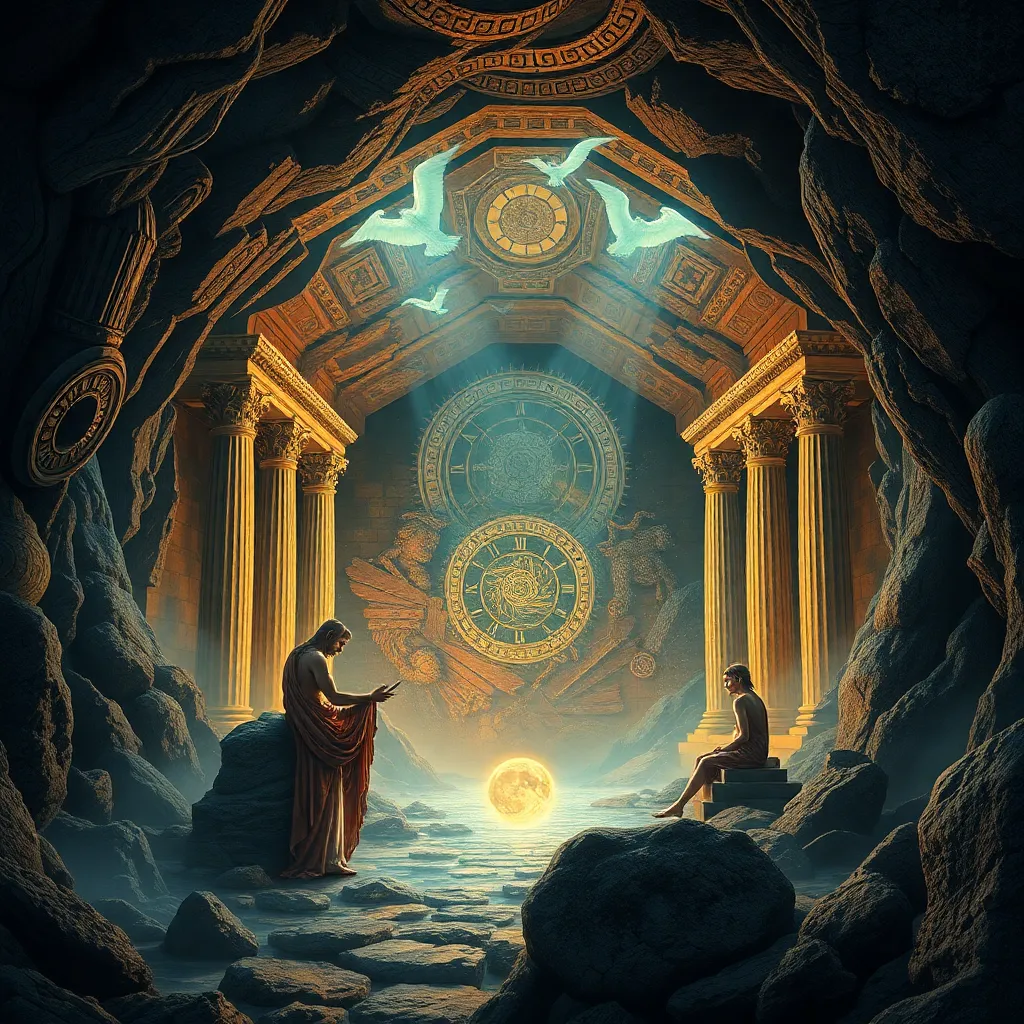The Underworld and the Concept of Time in Greek Mythology
I. Introduction
The Underworld in Greek mythology, often referred to as Hades, serves as a complex realm where souls reside after death. This enigmatic domain is more than just a place of eternal rest; it embodies the intricate relationship between life, death, and the passage of time. Understanding the Underworld is crucial for comprehending the broader narrative structures in Greek mythology, where time plays a significant role in shaping mortal and divine fates.
This article aims to explore the interplay between the Underworld and the concept of time, revealing how these elements are interwoven in mythological narratives and reflections of ancient Greek culture.
II. The Structure of the Underworld
The Underworld is not a monolithic entity but rather a structured realm containing various regions, each serving different purposes in the afterlife.
- Hades: The primary region, where most souls dwell after death, characterized by its somber atmosphere.
- Tartarus: A deep abyss used as a dungeon of torment for the wicked and as a place of punishment for the Titans.
- Elysium: A paradise for the virtuous and heroic souls, where they enjoy eternal bliss.
One of the crucial aspects of the Underworld’s geography is the River Styx, which souls must cross to enter the realm of the dead. Charon, the ferryman, plays a vital role in this journey, demanding payment in the form of an obol, a small coin, to transport souls across the river.
The geography of the Underworld reflects concepts of time in various ways, emphasizing the finality of death and the different experiences of souls based on their earthly lives.
III. The Role of Time in Greek Mythology
Time in Greek mythology is perceived both cyclically and linearly, creating a rich tapestry of narrative and meaning.
On one hand, the cyclical view of time is evident in the changing seasons, governed by the myth of Persephone, while linear time reflects the progression of fate and prophecy. Key aspects include:
- Cyclical Time: Represented by agricultural cycles and the seasons, symbolizing rebirth and regeneration.
- Linear Time: Associated with mortal lives, destinies, and the inevitability of death.
Fate and prophecy are intertwined with the concept of time, where the Moirai (Fates) weave the destinies of gods and mortals, illustrating how the passage of time impacts their lives and choices.
IV. The Afterlife and Temporal Existence
The journey of the soul after death is central to understanding the Underworld’s relationship with time. Upon death, souls traverse the River Styx and enter the Underworld, where their experiences vary significantly based on their earthly actions.
In the Underworld, time is perceived differently by souls:
- Souls in Hades: Experience a form of stasis, where time loses meaning, and they reflect on their lives.
- Souls in Elysium: Enjoy a timeless existence, free from the burdens of their previous lives.
The concepts of eternal punishment in Tartarus and eternal reward in Elysium underscore the moral weight of actions taken during mortal life, highlighting the intricate relationship between time, morality, and the afterlife.
V. Mythological Figures and Their Relationship with Time
Several mythological figures embody different aspects of time and its significance in the context of the Underworld:
- Hades: The ruler of the Underworld, Hades governs the realm with an understanding of the finality of death and the passage of time.
- Persephone: Her annual descent to the Underworld represents the cyclical nature of life and death, as she brings about the changing seasons.
- Chronos and Kairos: These two deities represent different aspects of time; Chronos signifies chronological time, while Kairos represents the opportune moment.
Each of these figures illustrates how time influences the narratives of gods and mortals, reinforcing the theme of temporal existence in the Underworld.
VI. Symbolism of Time in the Underworld
The Underworld is rich with symbolism related to time, emphasizing the themes of decay, rebirth, and mortality:
- Decay and Rebirth: The natural cycle of decay in the Underworld symbolizes the inevitable passage of time and the potential for rebirth.
- Temporal Markers: Mythological stories often contain events that signify the passage of time, such as the changing seasons or significant life events.
- Mortality and Time: The fleeting nature of life is a constant reminder of mortality, as characters navigate their fates in a time-bound existence.
This symbolism enriches the understanding of time within the context of Greek mythology, allowing for deeper interpretations of the narratives that involve the Underworld.
VII. Cultural Reflections and Legacy
Greek mythology has profoundly influenced modern interpretations of time and the afterlife, shaping cultural narratives and philosophical discussions.
When compared to other mythologies, Greek views on the Underworld reveal unique perspectives on time and existence:
- Comparison with Egyptian Mythology: While both cultures have a structured afterlife, Egyptian mythology emphasizes judgment and the potential for resurrection, differing from the Greek focus on the moral weight of one’s earthly actions.
- Influence on Literature and Philosophy: Greek concepts of time have permeated literature, philosophy, and art, inspiring discussions about the nature of existence and the human experience.
The legacy of Greek mythology continues to resonate, offering insights into the temporal aspects of life and death.
VIII. Conclusion
In conclusion, the interplay between the Underworld and the concept of time is a fundamental theme in Greek mythology. The structured regions of the Underworld, the cyclical and linear perceptions of time, and the symbolic representations of decay and rebirth all contribute to a rich narrative tapestry.
The significance of these themes extends beyond mythology, inviting ongoing exploration and reflection on the nature of existence, morality, and the passage of time. As we delve deeper into Greek myths, we uncover the complexities that continue to shape our understanding of life and the afterlife.




